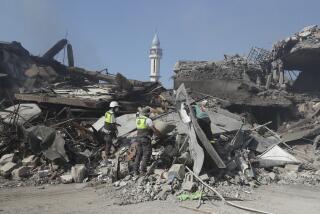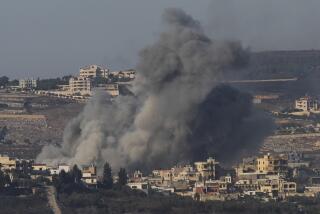British Copters Evacuate 17 Arab Deportees
JERUSALEM — British air force helicopters, flying under the auspices of the International Committee of the Red Cross, on Saturday evacuated 17 of the more than 400 Palestinians exiled to southern Lebanon by Israel five weeks ago as supporters of militant Islamic groups.
The 17 deportees, four of them seriously ill and 13 expelled by mistake, were flown to the Israeli port city of Haifa in an operation suggesting that a resolution of the international impasse over the group might soon be found.
The sick were sent to a hospital in Marjayoun in Israel’s self-proclaimed “security zone” in southern Lebanon for medical care; the other men were taken into custody by Israeli authorities for a review of charges against them.
The evacuation came as a roadside bomb ripped through an Israeli patrol in the security zone, killing two soldiers and wounding another, the Reuters news service reported from Beirut.
Four officials of the Geneva-based International Committee of the Red Cross accompanied the deportees to Haifa from their mountainside tent camp in a no-man’s-land between Israeli-controlled territory and Lebanese army lines.
Palestinian physicians at the camp wanted to evacuate 12 of the deportees and the Red Cross agreed to take eight, but Israel said it would permit only four--three with broken bones and one with a peptic ulcer--to leave for medical care.
“We will not forget the four our doctor said should be hospitalized (but were left behind after Israel refused to accept them), and we will see what we can do for these people,” said Yves Daccord, a Red Cross spokesman.
Two weeks ago, the Red Cross had organized a smaller mission, evacuating two deportees, but it was only Saturday that it was able to obtain the British Wessex 5 helicopters, which are based in Cyprus, and then to secure permission from the Israeli and Lebanese governments.
The Red Cross team also took the deportees three crates of badly needed medical supplies, but the Palestinians refused to accept them, saying that their problem is political in origin and cannot be resolved by humanitarian measures.
“We will not take in any medicine, food or clothes from the Red Cross,” Dr. Abdul Aziz Rantisi, a physician from the Gaza Strip and one of the leaders at the camp, said. “We continue to demand our return to our homes and families.”
Saturday’s evacuation apparently leaves 394 deportees in southern Lebanon. Israel originally put the number of deportees at 415, but it provided only 413 names to the Red Cross. The exiles said their total was indeed 413, but their census did not agree on 15 names with the list given the Red Cross. Israeli authorities refuse to publish a list of all those deported.
Although organized as a relief operation, the mission Saturday had considerable political significance, because Israel is hoping that such humanitarian efforts will lessen widespread pressure against it over the deportation and avert possible U.N. sanctions.
While Prime Minister Yitzhak Rabin, who ordered the mass deportation Dec. 17, continues to insist that it was the wisest course of action after guerrillas from militant Islamic groups killed six Israeli soldiers and policemen, his Cabinet is looking for a way out.
“This has become a great obstacle on the road to peace,” Ran Cohen, the deputy minister of housing from the leftist Meretz alliance, said Saturday during a visit to Cairo.
According to a poll of Cabinet members by the political correspondent of state-run Israeli television, 10 of the 18 ministers want a compromise.
The Israeli Cabinet, which meets today, is likely to review the situation in anticipation of calls for a further meeting of the U.N. Security Council on the issue. Although officials were initially confident that nothing would come of the U.N. condemnation of the deportation, they now take quite seriously the possibility of a harsher resolution and even sanctions.
More to Read
Sign up for Essential California
The most important California stories and recommendations in your inbox every morning.
You may occasionally receive promotional content from the Los Angeles Times.










